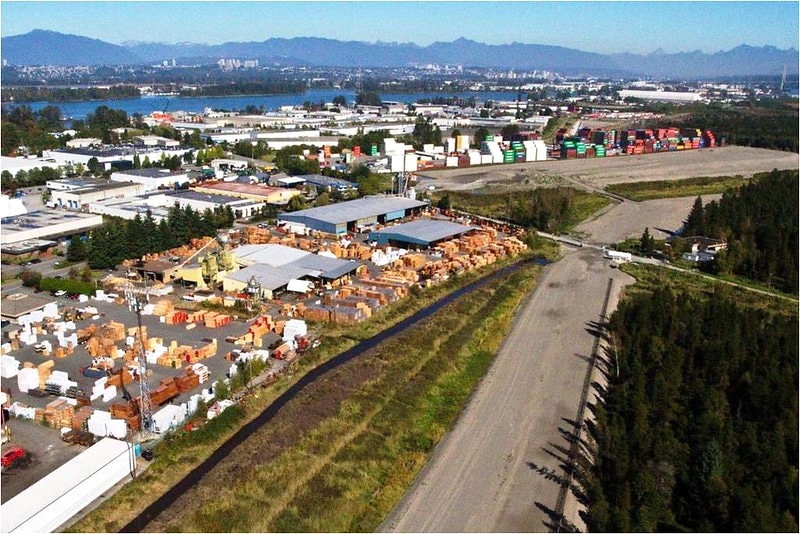
by Komoneed | Nov 29, 2024
All over the world, floods have been increasing in frequency and intensity due to climate change. A new study led by researchers at University of British Columbia (UBC) shows that protecting key ecosystems across Canada could reduce the risk of flooding in over half of urban areas in the country that are at high risk. […]
The post Safeguarding Natural Areas Can Protect Cities From Flooding, Canadian Study Finds appeared first on EcoWatch.

by Komoneed | Nov 29, 2024
November 2024 Newsletter Recap: COP29
jschoshinski
Wed, 11/27/2024 – 14:14
Did you miss the Climatelinks November newsletter? We’ve got you covered. Please find a recap of the November ‘COP29’ theme below. You won’t want to miss this short list of top resources and blogs from the month. Subscribe to our newsletter today. Do you want to contribute to the Climatelinks community? Send us a resource, blog, or event.
The 29th annual United Nations Climate Change Conference, or Conference of the Parties (COP) to the UNFCCC, ended last week in Baku, Azerbaijan. COP29 was an opportunity for governments, NGOs, public and private businesses, and civil society to make ambitious climate pledges. At previous COPs, USAID launched or announced its participation in a variety of climate initiatives that work towards building a more climate-secure future.
Fresh Blog Posts
Two Years, $380+ Million: Lessons Learned from USAID’s Climate Finance for Development Accelerator
At COP26, USAID’s Climate Finance for Development Accelerator (CFDA) launched with a goal of mobilizing $2.5 billion in public and private investment for climate by 2030. In two years of operations, CFDA has mobilized $380.7 million in sustainable investments and worked with partners to strengthen local ecosystems in over 60 countries. This blog outlines some of CFDA’s biggest lessons learned for catalyzing investment in the climate finance space.
Bridging the Adaptation Finance Gap Across Africa
Climate finance was a popular topic of conversation for governments, donors, and other stakeholders at COP29. In Africa, limited capacity and resources to develop proposals coupled with complex proposal requirements and high competition for limited funds have resulted in only a fraction of the available climate adaptation funding reaching the region. The African Adaptation Initiative, launched at COP21 and supported by USAID’s Climate Adaptation Support Activity, is working to bridge this climate finance gap.
Empowering Female Farmers: Introducing Solar Water Pumps in Rural Senegal
At COP29, one of the thematic days was focused on food, agriculture, and water in recognition that these sectors are both threatened by climate change and have a role to play in providing solutions to the crisis. USAID’s Scaling Up Renewable Energy Senegal program works at the intersection of agriculture, water, and energy through its efforts to expand access to solar solutions that increase the productivity of small businesses and enhance the livelihoods of rural communities.
Accessible Data Makes Renewable Energy Projects Possible Worldwide
Energy and science, technology, innovation, and digitalization were two of the thematic days at COP29. One example of how digital technologies can promote clean energy and address the climate crisis is the USAID-National Renewable Energy Laboratory Partnership’s Renewable Energy Data Explore. This geospatial analysis tool provides free global renewable energy resource data to inform policy, investment, and deployment decisions for solar, wind, and other energy resources.
Beyond Blueprints: Accelerate Implementation Now
USAID’s Comprehensive Action for Climate Change Initiative (CACCI) was launched at COP26 with the goal of identifying promising mitigation and adaptation investment opportunities with private sector partners to help countries meet their climate commitments and strengthen their climate resilience. Since then, CACCI has made progress on several fronts, including by increasing climate policy ambition, mobilizing the private sector, enhancing accountability and transparency, and bridging the gap between intention and results.
Tracking Impact: A Look Back at Past COP Initiatives Ahead of COP29
The annual COP is a chance to take stock of what progress has been made to meet climate goals. At previous COPs, USAID has launched climate initiatives related to climate finance, resilience, climate risk management, and more. This roundup of recent Climatelinks blogs highlights the progress driven by some of these initiatives.
New Resources
USAID 2024 Climate Monitoring, Evaluation, and Learning (MEL) Series
USAID programs with climate change benefits are required to report against a set of standard indicators. The 2024 Climate MEL webinar series was developed to improve reporting on these indicators. USAID staff and implementing partners are encouraged to review this series to explore key climate reporting topics, gain knowledge to inform annual reporting processes, and learn tips and tricks for navigating reporting and ensuring the quality of data in technical areas.
Sustainable Banking Alliance Learning Report: Engaging Local Financial Institutions to Integrate Climate Finance Best Practices
At COP27, USAID announced the launch of the Sustainable Banking Alliance (SBA), an initiative that partners with banks and microfinanciers to increase access to climate finance, promote the integration of climate finance best practices, and increase climate investments. This “how-to guide” builds on lessons learned from SBA initiatives in Colombia and Egypt and provides guidance to USAID, specifically to Mission staff, on how to engage with financial institutions to integrate climate finance best practices.
Investing in Resilience: Blue Carbon Ecosystems, Communities, and Finance for the Indo-Pacific
“Blue carbon” is carbon stored by coastal and marine ecosystems, such as mangroves, seagrass beds, coastal wetlands and marshes, tidal flats, and by marine organisms themselves. USAID’s Investing in Resilience report brings together evidence and analyses that can help USAID Mission staff, partners, host country governments, and communities advance blue carbon initiatives in the Indo-Pacific region.
Livelihood-Focused Climate Risk Assessment: Stress Testing Livelihood Options in the World’s Largest Terrestrial Transboundary Conservation Area
Climate change impacts are already being felt across the Kavango Zambezi (KAZA) Transfrontier Conservation Area. In recent years, residents have reported significant impacts to their livelihoods due to a combination of decreased rainfall, higher incidences of drought, changes in the timing of seasons, more hotter days and heat waves, and dwindling supplies of water. This Climate Risk Assessment seeks to answer how and in what ways a changing climate limits progress towards diversifying livelihoods for KAZA’s resident communities.
Climate Risk Management Spotlight
Climate Risk Management Resources and Training
Climate Risk Management (CRM) enhances the resilience and sustainability of USAID’s initiatives. By systematically assessing, addressing, and adaptively managing climate risks, CRM ensures effective use of U.S. taxpayer dollars. To promote CRM, USAID has produced a variety of resources and online trainings.
Call for Content
Share your events and resources or write a blog related to an upcoming monthly theme! Check out our upcoming themes to see if your climate work aligns:
December 2024: Year in Review
2024 Cross-cutting Themes: Systems Change and Locally Led Development
January 2025: Innovation
If your USAID-related climate change work relates to these themes, Climatelinks would love to feature your work and share your resources. Send us a resource or blog.
Teaser Text
Here’s a recap of the November ‘COP29’ theme. You won’t want to miss this short list of top resources and blogs from the month.
Publish Date
Wed, 11/27/2024 – 12:00
Author(s)
Climatelinks
Hero Image
“Ama’t anak” Father and son
Blog Type
Newsletter Recap
Strategic Objective
Adaptation
Integration
Mitigation
Region
Global
Topic
Adaptation
Climate Finance
Climate Risk Management
Climate Strategy
Digital technology
Clean or Renewable Energy
Private Sector Engagement
Resilience
Water Management
Weather
Sectors
Climate
Show Download Link
On

by Komoneed | Nov 29, 2024
Pictures of the new Range Rover Electric hot weather testing

by Komoneed | Nov 29, 2024
On 29th November, the world will once again fall under the Black Friday spell. We want to help you avoid the hype and embrace a more conscious approach to consumerism. 3 questions to help you avoid the Black Friday hype Originally an American phenomenon, Black Friday and its online cousin Cyber Monday have since spread […]
The post 3 Questions To Help You Avoid the Black Friday Hype appeared first on Good On You.

by Kate Mothes | Nov 29, 2024
The Catskill, New York-based artist explores the thinly veiled messages and codes embedded in mass-produced objects.
Do stories and artists like this matter to you? Become a Colossal Member today and support independent arts publishing for as little as $7 per month. The article In Striking Assemblages, Portia Munson Elucidates Societal Constraints on Women appeared first on Colossal.





